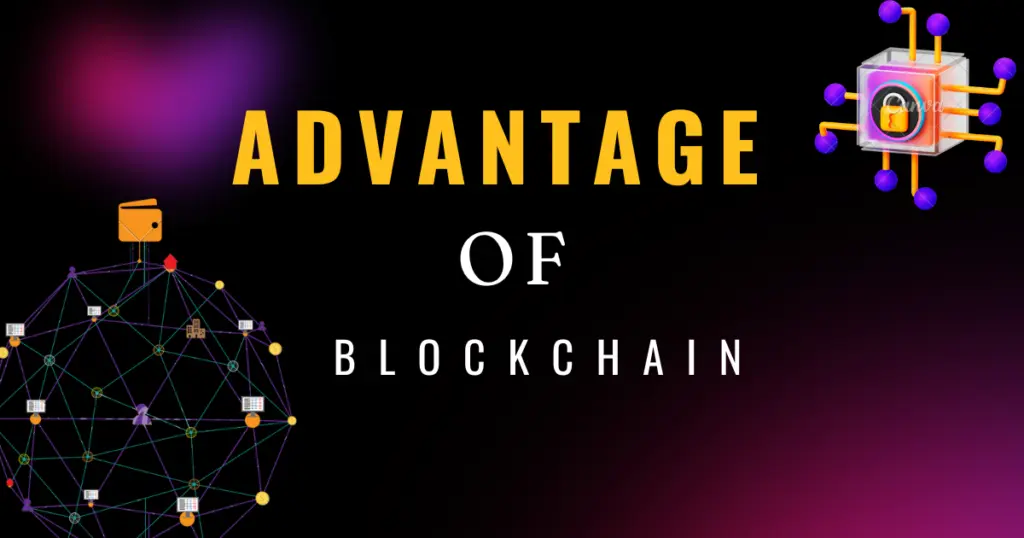Blockchain technology has turned into a hotly debated issue as of late, with businesses and industries hoping to harness its capability to change how data is stored and shared. This creative technology offers a secure and transparent method for recording transactions, making contracts more proficient, and verifying the realness of data. By utilising a decentralised and distributed ledger system, blockchain disposes of the requirement for intermediaries, lessening costs and improving the speed and exactness of transactions.

1. Expanded security in blockchain
Blockchain utilises advanced encryption techniques to securely store and safeguard transaction data, diminishing the risk of fraud and unauthorised access.
Blockchain technology offers plenty of benefits in today’s digital age, with expanded security being quite possibly its most conspicuous component. By using advanced encryption techniques, blockchain can securely store and safeguard transactional data, altogether lessening the risk of fraud and unauthorised access.
Traditionally, centralised databases are defenceless against security breaches and hacking assaults, as they depend on a solitary place of control. However, blockchain technology works on a decentralised network, fanning out the control and storage of data across different nodes.
This distributed engineering makes it almost unimaginable for programmers to think twice about systems, as they would have to hack into each and every hub to alter the data. This expanded degree of security is a distinct advantage in industries where data privacy and trustworthiness are of the utmost significance.
Besides, blockchain utilises cryptographic algorithms to guarantee that data stored on the network is tamper-proof. Each block in the chain contains an exceptional cryptographic hash that is produced in light of the data stored inside it. Any endeavour to alter the data in a block would bring about an adjustment of the hash value, cautioning all nodes in the network of the tampering. This makes it simple to distinguish and forestall fraud, making blockchain technology an exceptionally secure method for storing and moving delicate data.

As well as safeguarding against fraud and unauthorised access, blockchain technology additionally offers expanded transparency and discernibility.
Each transaction on the blockchain is recorded as a sequential request and shared across all nodes in the network, making it simple to follow the history of a specific resource or transaction. This transparency assists with building trust among parties, as they can verify the legitimacy of the data and guarantee its uprightness.
In addition, blockchain technology is impervious to restriction and control, as the decentralised nature of the network guarantees that no single substance has control over the data. This is especially advantageous in industries like finance, where centralised specialists have the ability to control or edit transactions.
With blockchain, transactions are verified and recorded by consensus among all nodes in the network, creating a level battleground for all members.
Generally speaking, the expanded security presented by blockchain technology is a unique advantage in today’s digital scene. By utilising advanced encryption techniques and a decentralised network, blockchain guarantees that data is securely stored and safeguarded from fraud and unauthorised access.
With its tamper-proof nature and transparent plan, blockchain technology is upsetting the manner in which we store and move delicate data, making way for a safer and more reliable digital future.
2. Transparency and unchanging nature: blockchain
Every transaction on a blockchain is recorded and verified by different parties, making a transparent and tamper-proof record that can be relied upon by undeniably elaborate parties.
One of the vital benefits of blockchain technology is its capacity to provide transparency and changelessness in transactions. Dissimilar to traditional centralised systems where data is stored in one focal area and controlled by a single substance, blockchain works on a decentralised network where each member has a duplicate of the ledger.
Every transaction on a blockchain is recorded and verified by different parties, known as nodes, in a cycle called consensus. This implies that no single element has control over the data, making it impervious to tampering or pernicious assaults.
When a transaction is added to the blockchain, it can’t be altered or erased, creating a tamper-proof record that can be relied upon by completely elaborate parties.
As a result of this transparency and permanence, blockchain technology is great for use in situations where trust and security are fundamental, for example, in financial transactions, supply chain management, and voting systems. By giving a reasonable and obvious record, all things considered, blockchain can assist with disposing of fraud, decreasing blunders, and upgrading responsibility in various industries.
Notwithstanding its tamper-proof nature, blockchain technology likewise offers expanded transparency in transactions. In a traditional centralised system, the progression of data is controlled by a single substance, making it hard for users to verify the exactness and respectability of the data.
With blockchain, however, every transaction is recorded on a public ledger that is accessible to all members.
This implies that anybody can see the history of a transaction, from its introduction to the end, and verify its legitimacy. This transparency assists with building trust among members, advances responsibility, and upgrades the general honesty of the system.
Moreover, the decentralised idea of blockchain guarantees that no single element can control the data for their own benefit. Since each member has a duplicate of the ledger and should arrive at a consensus prior to adding another block of transactions, the system is intended to forestall any unauthorised changes to the data.
3. Decentralisation: blockchain
Blockchain wipes out the requirement for intermediaries like banks or payment processors, taking into account direct peer-to-peer transactions and diminishing costs and deferrals.
One of the principal benefits of blockchain technology is decentralization. The traditional financial system depends vigorously on intermediaries, for example, banks or payment processors, to work with transactions.
These intermediaries assume an urgent role in verifying and handling payments, which can bring about delays and extra costs for users.
With blockchain technology, however, the requirement for intermediaries is eliminated. Rather than depending on a centralised power to support transactions, blockchain considers direct peer-to-peer transactions.
This implies that users can execute with one another straightforwardly, without the requirement for an outsider to work with the trading of significant worth.
By eliminating intermediaries from the situation, blockchain technology assists with smoothing out the transaction interaction, decreasing costs and deferrals for users.
Since transactions are approved by a decentralised network of computers, there is no weak link that can upset the progression of transactions. This prompts a more effective and secure approach to managing transactions without the requirement for a confided-in intermediary to supervise the cycle.
As well as diminishing costs and deferrals, decentralisation additionally offers more noteworthy transparency and security. Since all transactions are recorded on a public ledger that is noticeable to everybody in the network, there is a greater level of transparency and responsibility. This assists with forestalling fraud and tampering, as all transactions are verified and recorded in a secure and changeless manner.
Moreover, decentralisation likewise assists with safeguarding client privacy. With traditional payment systems, users are frequently expected to give individual data to intermediaries to handle transactions. This data can be powerless against security breaches and abuse. With blockchain technology, however, users can execute secretly without the need to reveal delicate individual data.
In general, decentralisation is one of the vital benefits of blockchain technology. By killing the requirement for intermediaries and empowering direct peer-to-peer transactions, blockchain offers a more productive, secure, and savvy approach to managing transactions.
This not only advantages users by lessening costs and postponements, but also upgrades transparency, security, and privacy in the transaction cycle.



Pingback: Understanding the Practical Uses of Blockchain -